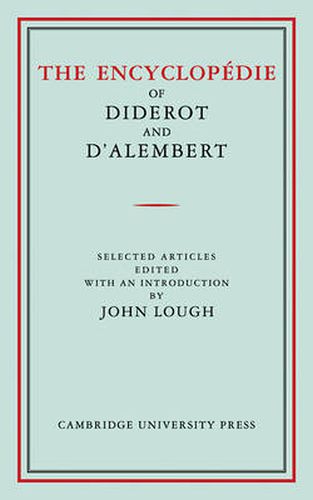Readings Newsletter
Become a Readings Member to make your shopping experience even easier.
Sign in or sign up for free!
You’re not far away from qualifying for FREE standard shipping within Australia
You’ve qualified for FREE standard shipping within Australia
The cart is loading…






The publication of the Encyclopedie in the middle of the eighteenth century is generally recognised as a decisive factor in the conflict ideas which led to the French Revolution of 1789. Yet, despite its importance in the history of eighteenth-century French thought, no outstanding work of the period is less read today, simple because of its bulk and inaccessibility. Those parts reproduced in this edition cover religion, philosophy, science and political and social ideas and include articles which reflect the humanitarian outlook of the contributors and their attitude to the abuses of the ancien regime. The selection is of value not only to students of French literature and thought, but also to all those interested in the history and political ideas of France on the eve of the Revolution; in these pages Diderot, D'Alembert and D'Holbach are allowed to speak for themselves, instead of having their ideas summarised (and sometimes misinterpreted) by others.
$9.00 standard shipping within Australia
FREE standard shipping within Australia for orders over $100.00
Express & International shipping calculated at checkout
Stock availability can be subject to change without notice. We recommend calling the shop or contacting our online team to check availability of low stock items. Please see our Shopping Online page for more details.
The publication of the Encyclopedie in the middle of the eighteenth century is generally recognised as a decisive factor in the conflict ideas which led to the French Revolution of 1789. Yet, despite its importance in the history of eighteenth-century French thought, no outstanding work of the period is less read today, simple because of its bulk and inaccessibility. Those parts reproduced in this edition cover religion, philosophy, science and political and social ideas and include articles which reflect the humanitarian outlook of the contributors and their attitude to the abuses of the ancien regime. The selection is of value not only to students of French literature and thought, but also to all those interested in the history and political ideas of France on the eve of the Revolution; in these pages Diderot, D'Alembert and D'Holbach are allowed to speak for themselves, instead of having their ideas summarised (and sometimes misinterpreted) by others.